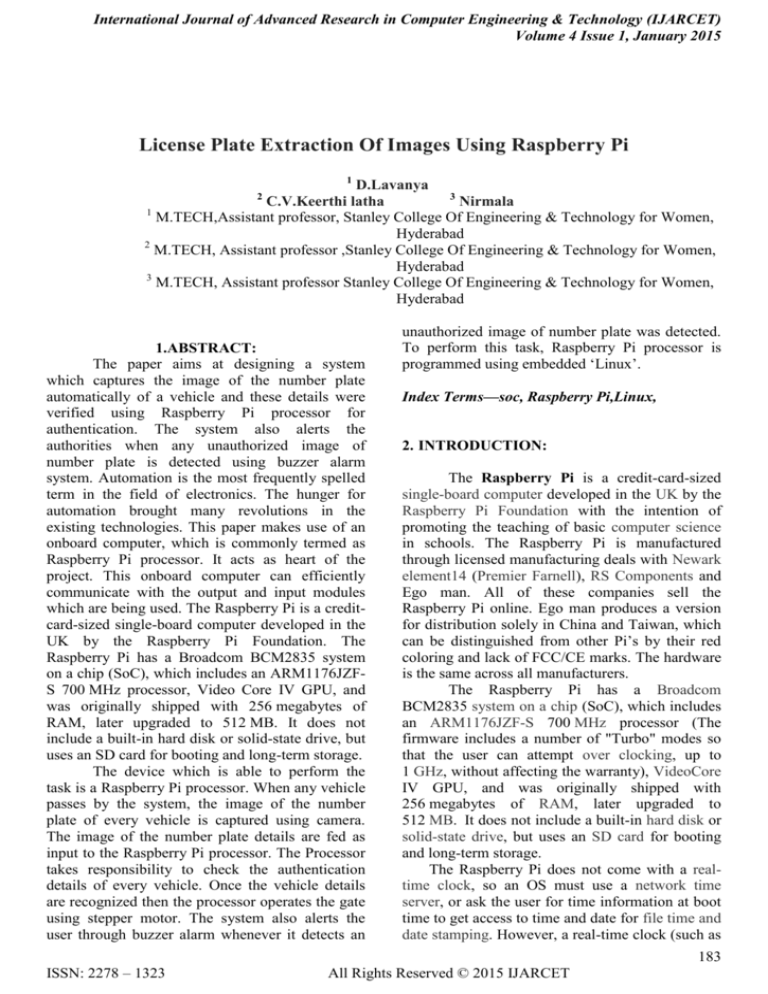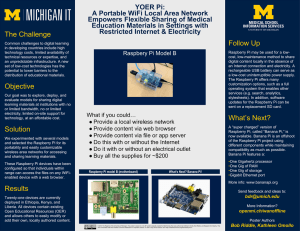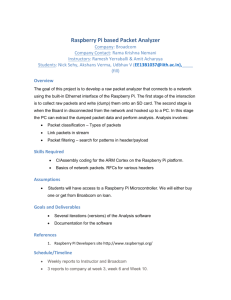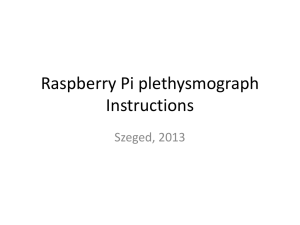
International Journal of Advanced Research in Computer Engineering & Technology (IJARCET)
Volume 4 Issue 1, January 2015
License Plate Extraction Of Images Using Raspberry Pi
1
D.Lavanya
3
C.V.Keerthi latha
Nirmala
1
M.TECH,Assistant professor, Stanley College Of Engineering & Technology for Women,
Hyderabad
2
M.TECH, Assistant professor ,Stanley College Of Engineering & Technology for Women,
Hyderabad
3
M.TECH, Assistant professor Stanley College Of Engineering & Technology for Women,
Hyderabad
2
1.ABSTRACT:
The paper aims at designing a system
which captures the image of the number plate
automatically of a vehicle and these details were
verified using Raspberry Pi processor for
authentication. The system also alerts the
authorities when any unauthorized image of
number plate is detected using buzzer alarm
system. Automation is the most frequently spelled
term in the field of electronics. The hunger for
automation brought many revolutions in the
existing technologies. This paper makes use of an
onboard computer, which is commonly termed as
Raspberry Pi processor. It acts as heart of the
project. This onboard computer can efficiently
communicate with the output and input modules
which are being used. The Raspberry Pi is a creditcard-sized single-board computer developed in the
UK by the Raspberry Pi Foundation. The
Raspberry Pi has a Broadcom BCM2835 system
on a chip (SoC), which includes an ARM1176JZFS 700 MHz processor, Video Core IV GPU, and
was originally shipped with 256 megabytes of
RAM, later upgraded to 512 MB. It does not
include a built-in hard disk or solid-state drive, but
uses an SD card for booting and long-term storage.
The device which is able to perform the
task is a Raspberry Pi processor. When any vehicle
passes by the system, the image of the number
plate of every vehicle is captured using camera.
The image of the number plate details are fed as
input to the Raspberry Pi processor. The Processor
takes responsibility to check the authentication
details of every vehicle. Once the vehicle details
are recognized then the processor operates the gate
using stepper motor. The system also alerts the
user through buzzer alarm whenever it detects an
unauthorized image of number plate was detected.
To perform this task, Raspberry Pi processor is
programmed using embedded ‘Linux’.
Index Terms—soc, Raspberry Pi,Linux,
2. INTRODUCTION:
The Raspberry Pi is a credit-card-sized
single-board computer developed in the UK by the
Raspberry Pi Foundation with the intention of
promoting the teaching of basic computer science
in schools. The Raspberry Pi is manufactured
through licensed manufacturing deals with Newark
element14 (Premier Farnell), RS Components and
Ego man. All of these companies sell the
Raspberry Pi online. Ego man produces a version
for distribution solely in China and Taiwan, which
can be distinguished from other Pi’s by their red
coloring and lack of FCC/CE marks. The hardware
is the same across all manufacturers.
The Raspberry Pi has a Broadcom
BCM2835 system on a chip (SoC), which includes
an ARM1176JZF-S 700 MHz processor (The
firmware includes a number of "Turbo" modes so
that the user can attempt over clocking, up to
1 GHz, without affecting the warranty), VideoCore
IV GPU, and was originally shipped with
256 megabytes of RAM, later upgraded to
512 MB. It does not include a built-in hard disk or
solid-state drive, but uses an SD card for booting
and long-term storage.
The Raspberry Pi does not come with a realtime clock, so an OS must use a network time
server, or ask the user for time information at boot
time to get access to time and date for file time and
date stamping. However, a real-time clock (such as
183
ISSN: 2278 – 1323
All Rights Reserved © 2015 IJARCET
International Journal of Advanced Research in Computer Engineering & Technology (IJARCET)
Volume 4 Issue 1, January 2015
the DS1307) with battery backup can be added via
the I²C interface.
3. PROJECT OBJECTIVES:
Usage of image authentication technology.
Capturing of Vehicle number plate details
using camera.
Unauthorized authentication and alerting
through buzzer alarm.
Number plate recognition indication even
through LED indicators.
4. PROBLEM DEFINITION:
In this paper [1] there is no mention of
usage of microcontroller for detection of
images.
As security plays a major role,
authenticating of number plate is required.
This project includes authentication using
android mobile with special application
developed in it.
Edge based algorithm cannot reduce noise
to overcome this problem Neural Network
Technique is used. Different fonts in
number
plate
is
not
mentioned.
Experiments are made to verify different
font sizes.
developed in the UK by the Raspberry Pi
Foundation. The Raspberry Pi has a
Broadcom BCM2835 system on a chip
(SoC), which includes an ARM1176JZF-S
700 MHz processor, Video Core IV GPU,
and was originally shipped with
256 megabytes of RAM, later upgraded to
512 MB. It does not include a built-in hard
disk or solid-state drive, but uses an SD
card for booting and long-term storage.
The device which is able to perform the
task is a Raspberry Pi processor. When any
vehicle passes by the system, the image of
the number plate of every vehicle is
captured using camera. The image of the
number plate details are fed as input to the
Raspberry Pi processor. The Processor
takes responsibility to check the
authentication details of every vehicle.
Once the vehicle details are recognized
then the processor operates the gate using
stepper motor. The system also alerts the
user through buzzer alarm whenever it
detects an unauthorized image of number
plate was detected. To perform this task,
Raspberry Pi processor is programmed
using embedded ‘Linux’
6. Block diagram Overview:
5.
SPECIFICATIONS
OF
THE
PROJECT:
5.1 Project description:
The paper aims at designing a
system which automatically captures the
image of the number plate of a vehicle and
these details were verified using Raspberry
Pi processor for authentication. The system
also alerts the authorities when any
unauthorized image of number plate was
detected using buzzer alarm system.
Automation is the most frequently spelled
term in the field of electronics.
This paper makes use of an onboard
computer, which is commonly termed as
Raspberry Pi processor. The onboard
computer can efficiently communicate with
the output and input modules which are
being used. The Raspberry Pi is a creditcard-sized
single-board
computer
183
ISSN: 2278 – 1323
All Rights Reserved © 2015 IJARCET
International Journal of Advanced Research in Computer Engineering & Technology (IJARCET)
Volume 4 Issue 1, January 2015
7. DESIGN AND IMPLEMENTATION:
7.1 Hardware Tools:
Figure1: Architectural description of
Raspberry pi
6.1 Description:
Arm-11 processor consists of 26 GPIO
pins. Among which we are using 3 pins are used
for led, buzzer and motor. For running motor the
driver used is L293D.It has 16 pins.3rd and 6th pin
are used to rotate motor in clockwise and
anticlockwise.4th and 5th pins are grounded.
Process Flow/ Flowchart explaining how gate
operates.
The
ARM1176JZF-S
processor
incorporates an integer core that implements the
ARM11 ARM architecture v6. It supports the
ARM and Thumb™ instruction sets, Jazelle
technology to enable direct execution of Java
bytecodes, and a range of SIMD DSP instructions
that operate on 16-bit or 8-bit data values in 32-bit
registers. The ARM1176™ applications processors
deployed broadly in devices ranging from smart
phones to digital TV's to eReaders, delivering
media and browser performance, a secure
computing environment, and performance up to
1GHz in low cost designs. The ARM1176JZ-S
processor features ARM TrustZone technology for
secure applications and ARM Jazelle technology
for efficient embedded Java execution. Optional
tightly coupled memories simplify ARM9™
processor migration and real-time design,
while AMBA 3
AXITM interfaces
improve
memory bus performance. DVFS support enables
power optimization below the best-in-class
nominal static and dynamic power of
the ARM11TM processor architecture
Figure 2:Overview of Raspberry pi
184
ISSN: 2278 – 1323
All Rights Reserved © 2015 IJARCET
International Journal of Advanced Research in Computer Engineering & Technology (IJARCET)
Volume 4 Issue 1, January 2015
8. Overall features:
Processor
:700MHZ ARM11
Ram
: 512MB
SRam
: 400MHZ
Operating voltage : 5V
Video Connections : 1HDMI
Audio
: Stereo over HDMI
OS
: Raspbian, Anroid
Power
: 150-350
GPIO Capability : 8 pins
Memory
: 32 kb for level 1 cache
128kb for level2cache
9. RESULTS:
185
ISSN: 2278 – 1323
All Rights Reserved © 2015 IJARCET
International Journal of Advanced Research in Computer Engineering & Technology (IJARCET)
Volume 4 Issue 1, January 2015
10. EXPERIMENTAL SETUP:
186
ISSN: 2278 – 1323
All Rights Reserved © 2015 IJARCET
International Journal of Advanced Research in Computer Engineering & Technology (IJARCET)
Volume 4 Issue 1, January 2015
b) Received
application
image
on
android
Case:2
Font type: Times new roman
Font size: 30
11 RESULTS:
Case:1
Font type: calibri
Font size: 45
a) input image
a) Input image
187
ISSN: 2278 – 1323
All Rights Reserved © 2015 IJARCET
International Journal of Advanced Research in Computer Engineering & Technology (IJARCET)
Volume 4 Issue 1, January 2015
b) received image on users android
application
Output image shows a failure of
reception due to fading in the input
image .
Output received refers to the input image
Case:3
Font type: Arial
Font size: 30
a) input image
b) Failure in reception
12 CONCLUSIONS
SCOPE:
AND
FUTURE
12.1 CONCLUSION:
The paper was designed a system which
captures the image of the number plate of a
vehicle and these details of number plate were
verified with the predefined details using
Raspberry Pi processor for authentication. The
system alerts the authorities when any
unauthorized image of number plate was
detected through camera using buzzer alarm
system.
License plate extraction method is
designed for real-time Indian license plate
extraction. Input to the system is an image
which contains the license plate, acquired by a
digital camera of the front or rear of the
vehicle; and its output is the license plate
region. The method comprises the following
major stages, which are: RGB to gray-scale
conversion, vertical edge detection and image
linearization, analysis and dilation, vertical
projection and thresholding, extracting the
accurate location of the license plate, filtration
and image enhancement, linearization and
smoothing
process,
and
Character
segmentation for horizontal and vertical.
Software tool we are using as Linux
operating system. Linux . Linux Operating
System has primarily three components.
Kernel, System Library System Utility . Linux
is an open-source Operating System. People
can change codes and add programs to Linux
OS which will help use your computer better.
Linux is customizable but Windows is not.
Linux has high security.
Results has been verified by using
Raspberry pi ,using an application on Android
mobile. After camera recognizes the number
plate the information is sent to user through
wifi module. User checks and authenticates the
188
ISSN: 2278 – 1323
All Rights Reserved © 2015 IJARCET
International Journal of Advanced Research in Computer Engineering & Technology (IJARCET)
Volume 4 Issue 1, January 2015
system. If there is any unauthorized user buzzer
will on automatically. Experimental results
shows the proposed system using Raspberry pi
can authenticate the system successfully.
12.2. FUTURE WORK:
This paper can be extended using high
efficiency GPS receiver and a GPRS module. The
GPRS module gives the intimation of the vehicle
racking directly on to the predefined web link for
tracking the vehicle on Google maps. The project
can be extended using USB camera for vehicle
monitoring from longer distances. The project can
be extended using memory card using which the
traveled path can be stored which helps in storing
the tracked path along with speed and time.
13 REFERENCES:
[1] T. L. Chien, H. Guo, K.L. Su and S.V. Shiau,
"Develop a Multiple Interface Based Fire Fighting
Robot," IEEE International Conference on
Mechatronics, May 2007.
[2] K. L. Su, "Automatic Fire Detection System
Using Adaptive Fusion Algorithm for Fire Fighting
Robot," IEEE International Conference on
Systems, Man and Cybernetics, Vol. 2, Oct. 2006.
[3] T. L. Chien, H. Guo, K.L. Su and S.V. Shiau,
"Develop a Multiple Interface Based Fire Fighting
Robot," IEEE International Conference on
Mechatronics, May 2007.
[4] J.H. Park, B.W. Kim, D.J. Park and M.J. Kim,
"A system architecture of wireless communication
for fire-fighting robots," Proceedings of the 17th
World Congress The International Federation of
Automatic Control, July 2008.
[5]Benjamin C. Kuo, Step Motors and Control
Systems, SRL Publishing Company, Champagne, IL,
1979
189
ISSN: 2278 – 1323
All Rights Reserved © 2015 IJARCET








